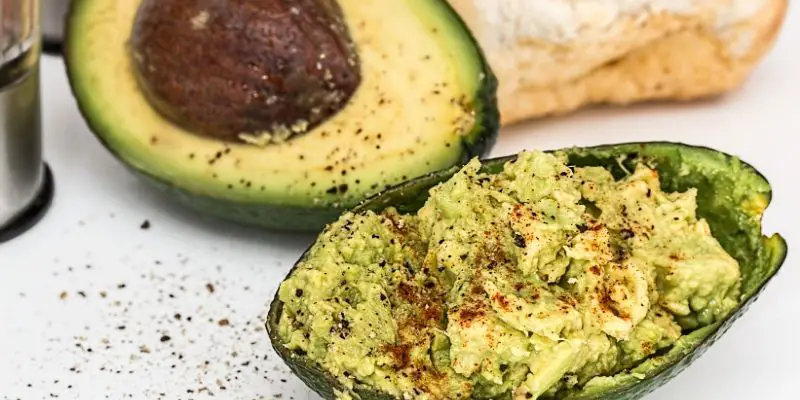You might see how your dog literally drools each time you eat avocados. And your pet has a reason to do so. Avocados are tasty and appealing, which is why dogs love it. But the question that remains is whether or not you should feed your pet this type of food. Let’s discover the truth about avocados up next.
Are you interested in a particular topic about dogs and avocados? Then use the table of contents below to jump to the most relevant section. And you can always go back by clicking on the black arrow in the right bottom corner of the page. Also, please note that some of the links in this article may be affiliate links. For more details, check the Disclosure section at the bottom of the page.
- Are avocados poisonous to dogs?
- Can avocado be harmful to dogs at all?
- Are avocados good for dogs?
- My dog ate avocado. Should I call the vet?
- And what if the dog ate avocado pit?
- Can dogs have guacamole?
- Can dogs eat avocado oil?
- Avocado in dog’s food
- Homemade dog recipes with avocado
- Can dogs have avocado? Summary.
Are avocados poisonous to dogs?
Avocado leaves, bark, and skin are the ones that can be poisonous to dogs. These are covered with persin, a natural antifungal ingredient produced by the avocado plant. Keep in mind that in small quantities, this substance will most likely not cause side effects. Still, eating large amounts of persin might lead to an upset stomach in leaves.

Can avocado be harmful to dogs at all?
Of course, there is another danger associated with dogs and avocados. But it doesn’t come from the skin or pulp. The pit of an avocado can be dangerous for dogs as it doesn’t get digested in your pup’s digestive tract. This can lead to gastric or intestinal blockage.

Are avocados good for dogs?

If your dog doesn’t have allergies or any other type of food sensitivity, feeding him a small amount of avocado can be safe. It has a lot of vitamin D (133 IU per 100g) and fiber (6.7g per 100g). Still, be careful about how much avocado pulp your dog has. In some situations, it can lead to pancreatitis, due to your pet’s extreme sensitivity to specific foods.

My dog ate avocado. Should I call the vet?
If your dog ate the pulp of an avocado, you should watch him for up to 48 hours to see whether or not he is experiencing some side effects.
Usually, the flesh won’t pose any health risks, but for some dogs, it can lead to vomiting or abdominal discomfort. If this is the case with your pup, you should opt for a vet check-up as soon as possible.
If your dog ingested the avocado pit, leaves, bark, or skin, it is best to rush him immediately to the vet’s office. These parts of an avocado can be dangerous for any pet, especially for dogs. These don’t get digested in their tract, which leads to blockages.
Besides, the persin compound found on avocado leaves or skin has the potential to poison your furry friend.

And what if the dog ate avocado pit?
If you suspect your dog ingested an avocado pit, you should go for an emergency veterinary visit. In most situations, it won’t get naturally removed from your dog’s digestive system.
This signifies a surgical procedure might be required to remove the pit. An avocado pit can get stuck in your dog’s digestive tract, meaning it can lead to a life-threatening situation.

Can dogs have guacamole?
Dogs can have a tiny bit of avocado as part of a healthy meal plan. But your standard avocado probably won’t be the best choice for your pup. Most of the conventional recipes are always include onions and garlic.
And you should never feed those to your dog.
However, you can make a dog-friendly version of guacamole by squishing half of an avocado. Mix a teaspoon of it with plain boiled chicken breast or dig pup’s favorite dog biscuits into the dip. And you can eat the rest of the squashed avocado by yourself by adding a bit of lemon juice, salt, and pepper for seasoning.
Big hit healthy on Amazon

Can dogs eat avocado oil?
If used with moderation, dogs can have small amounts of avocado oil. This is rich in vitamin E and omega-three fatty acids, which boost the wellbeing of your dog. Feed your dog small quantities of this oil, as it has to a high nutritional intake of fat.
Specialists recommend adding a teaspoon of avocado oil to your dog’s food once a week. Anything that exceeds that can pose some health risks for your pup. Overall, avocado oil is one of the healthiest foods you can feed your dog to keep him healthy and happy.

Avocado in dog’s food
Several dog products feature a small quantity of avocado. These are meant to keep up the health of your furry friend and offer him a nutritious diet.
As an example, we have the , which is excellent as a healthy snack. It is a treat that aims to support the oral health of your dog, and it can keep at bay plaque and tartar.
Besides, each dog owner that used this treat says the dog loved every bit of it!

Homemade dog recipes with avocado

You can make all sorts of homemade dog recipes with avocado. For example, the one suggested by The Honest Kitchen. And this company makes amazing dog food consistently, so they probably know what they are talking about.
So here’s the suggestion:
- Take one ripe avocado and peel it.
- Remove the pit and save only the pulp.
- Mash it and mix it with two eggs and gradually add up to two cups of oat flour.
- Mix all the ingredients until creamy.
- Spread the composition on your table and portion it in small treats. You can get your inspiration from other dog treats and create fun shapes.
- Bake for up to 20 minutes until it reaches a brown color.

Can dogs have avocado? Summary.
Overall, dogs can safely have avocado pulp or avocado oil, if consumed in small quantities. Besides, it can offer several health benefits if a healthy meal plan completes this tasty food. Still, as usual, it is always best to ask your vet’s advice before feeding your pup avocado.
Depending on his pre-existing conditions, he might not be allowed to eat this food. And as always, when trying to introduce new food to your pup’s diet, start with the tiny serving size. The serving size can be increased once you’ve established that your dog doesn’t have any adverse reactions to it.
Thanks for the blog graphics: Canva.com


